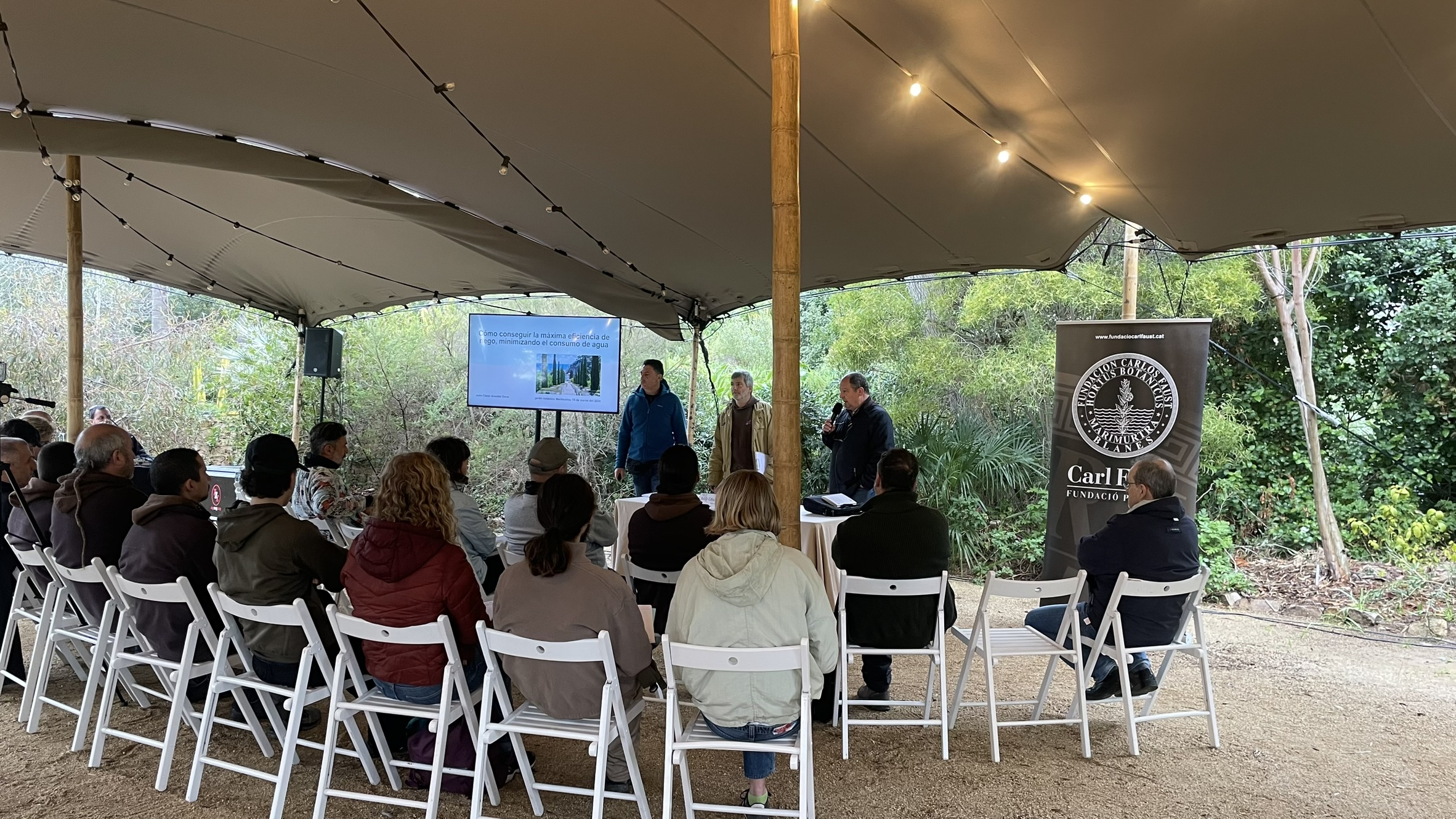Aquest any també se celebra el 150è aniversari del naixement del fundador i el centenari del Jardí Botànic Marimurtra
Cada 24 d’abril, la Fundació Carl Faust commemora l’aniversari de la mort del creu creador, Carl Faust. Enguany, la Fundació ha organitzat un seguit d’actes per aquest dimecres que recordaran l’esperit d’esforç i passió per la botànica del seu fundador. Aquest 2024, la celebració és per partida triple ja que també se celebra el centenari del Jardí Botànic Marimurtra i el 150è aniversari del naixement de Carl Faust.
Els actes han començat al matí amb una ofrena floral a la tomba de Faust, al cementiri de Blanes, amb l’assistència de diversos membres del patronat de la Fundació Carl Faust i de l’equip del Jardí Botànic Marimurtra. Posteriorment, s’ha dut a terme una ofrena floral a l’estàtua de Carl Faust situada al Passeig de Mar de Blanes en la que també hi han participat l’alcalde de Blanes, Il·lm. Sr. Jordi Hernández, el regidor de Medi Ambient, Parcs i Jardins, Sr. Jaume Frigola, els alumnes de 3r de primària de l’escola Carles Faust de Blanes, amb un mestre i el director del centre escolar, Carles Martín. Els alumnes han obsequiat als diferents membres de l’acte amb un bolígraf personalitzat de l’escola, i la Fundació Carl Faust ha agraït la participació dels estudiants entregant-los un punt de llibre del centenari del Jardí Botànic Marimurtra.
Amb motiu d’aquest acte simbòlic, el patronat recorda “els valors fundacionals del Jardí Botànic Marimurtra i del seu creador, que va projectar un jardí de referència mundial”, i ha afegit que “aquests fonaments poden servir com a model per treballar aspectes actuals com el reaprofitament de l’aigua, l’ecologia i la conservació de la biodiversitat”.
En ocasió d’aquesta jornada dedicada a la memòria de Carl Faust, la Fundació que porta el seu nom ha començat a desvelar alguns dels actes de commemoració del centenari que tindran lloc en el proper any. Entre d’altres, destaca la posada en marxa del Festival Familiar Botànic “Marimurtríssim”, la presentació de diverses exposicions a la Biblioteca Comarcal de Blanes i de diferents sales d’exposicions municipals, la celebració de conferències amb motiu del centenari, presentacions de llibres de l’editorial pròpia de la Fundació “Edicions de Marimurtra” i una edició especial de la Setmana de la Ciència a la recta final de l’any.
Fa cent anys que Carl Faust va crear un jardí botànic als primers penya-segats de la Costa Brava per poder-lo oferir a la ciència i als científics. Va crear un lloc on es poguessin estudiar les plantes i la vida. Cent anys després, la Fundació Carl Faust continua gestionant el Jardí Botànic Marimurtra, mantenint la seva col·lecció botànica i posant-lo a disposició de la recerca, la conservació i la divulgació científica. Tot plegat, afrontant els nous reptes que planteja modernament la gestió de la biodiversitat i el canvi climàtic. En resum, continua realitzant el somni al qual Carl Faust va dedicar el seu patrimoni i la seva vida.
La Fundació Carl Faust va ser mereixedora el 2009 de la Creu de Sant Jordi i el Jardí Botànic Marimurtra està classificat com a Bé Cultural d’Interès Nacional per la Generalitat de Catalunya.

Cronologia de Carl Faust
1874 > Carl Faust neix a Hadamar (Alemanya)
1918 > Comença a comprar terrenys a la muntanya de sant Joan de Blanes -horts i vinyes arrasades per la fil·loxera- amb la idea de convertir-les en el seu somni: un jardí botànic.
1921 > Faust fa construir la casa que és el cor del Jardí Botànic i de la Fundació. Una obra de l’arquitecte noucentista Josep Goday que actualment és el punt de benvinguda dels visitants al Jardí Botànic
1924 > Faust compleix 50 anys i decideix dedicar la resta de la seva vida a completar el seu somni, la creació d’un jardí botànic al servei de la ciència i els científics.
1927 > Carl Faust es trasllada a viure a Blanes, d’on ja no marxarà mai més, excepte pel període de la Guerra Civil.
1936 > La Guerra Civil Espanyola sorprèn a Faust de vacances a Alemanya, i l’impedeix tornar a Blanes fins que finalitza. Acaba de començar la construcció d’un dels elements més icònics de Marimurtra, el templet de Linné, obra de Josep Goday.
1940 > Acaba la construcció del templet de Linné.
1943 > Coneix al científic Ramon Margalef.
1951 > Faust crea la Fundació Carl Faust, amb seu a Blanes, per donar continuïtat a la seva obra.
1952 > Mor a la casa del Jardí Botànic Marimurtra el dia 24 d’abril. És enterrat al cementiri de Blanes.





